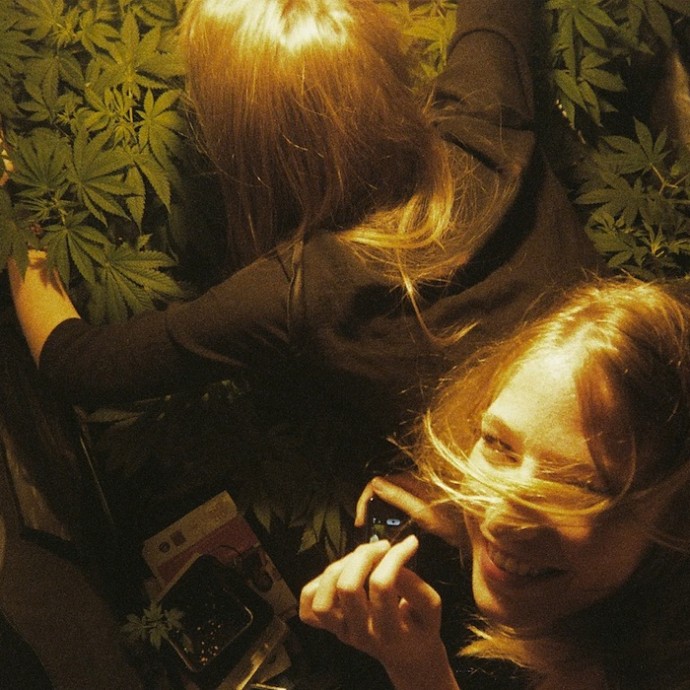What does “being productive” mean? Working hard and earning money, while being healthy and making others happy?
We listened to Elisabeth’s story about her experiences as a weed trimmer in California. Weed trimming generally involves going somewhere very remote, being there for some time, and coming out with a lot of money. Elisabeth told us about the fun, the fear, and the meditation of working within this legal grey area—and about how one side of productivity can take over another.
California’s rolling hills are perfect for the plant to grow. And they’re beautiful: yellow grass spotted with evergreens and California oak trees. These gold mining areas are dirt road places for sure, so once you get out there you’re not in contact with society that much. Going to a reggae show in the area felt like my entry point to the whole experience. There were so many dreadlocks and literally people with weed falling out of their pockets, handing out hundred dollar bills like, fuck, it was nuts.
A friend of mine had worked as a trim girl before, and she knew that I needed a job, so she arranged for me to work there. The weed farmers always need lots of workers in the harvesting season. Some people trim every autumn and then leave with ten to fifteen grand. That’s one way to do it, you know. To pay back student loans, for example.
A friend of mine had worked as a trim girl before, and she knew that I needed a job, so she arranged for me to work there.
The closest towns to the trimming sites are Americana, or what could be called white trash. But this has to be said with a lot of love, because it means farming or maybe industrial work—so those people are labourers, like the weed farmers and trimmers themselves. Where we worked, it felt like we were contained in something and we didn’t know where the boundaries of it were.
There was a long driveway and a couple of big hoop greenhouses, then a field that was terraced with all the plants and the yurt. That’s where we lived and worked, in the yurt. In the mornings, people woke up, rolled up their sleeping bags, pushed them to the sides and started trimming. The yurt was a thirty-feet diameter space that was housing fifteen people. It’s really not as big as you’d imagine. We were eight to ten women working there who were all into yoga-body-work-therapy-ish lifestyles, teaching each other meditation methods, yoga moves, and massage techniques. And then there were these Indian men from Mexico who were for the most part silent.
Our site was in a valley in between mountains. It’s a really complicated geographic area to survey; there are so many little nooks and crannies. Sometimes there was fear. Especially in the beginning, when the Feds were flying around looking at properties from helicopters. You didn’t imagine that anything would happen because it seemed so calm most of the time. Still, there were moments where it felt like a war, you know.
I’d like to think that people who are acting in the name of the law are doing it with some genuine sense of justice. But it seems to me that the cops are mostly on the side of the kids that didn’t get picked for the kickball team in school, that they feel like they’re not part of this something that they don’t understand. Therefore they’re just going to fuck it up as much as they can. For example, I heard stories about how the Feds got into another weed farmer’s property and destroyed the entire house, ate the food from the fridge, and smashed the girl’s piggy bank. It’s complete disrespect! So, say the Feds did come, where would we go? There was no sheet with a backup plan, because there was no responsibility held if something were to happen. Maybe that’s something we were attracted to in the experience to begin with.
I heard stories about how the Feds got into another weed farmer’s property and destroyed the entire house, ate the food from the fridge, and smashed the girl’s piggy bank
Another attraction of the job was the money we could make, since we were supposed to be working from 7.30 in the morning until 11 o’clock at night, and got paid in pounds. The going rate was 200 dollars a pound. You can see how this adds up pretty quickly. I was there for two and a half months, and I made almost five grand. But I spent some of that money buying a truck that didn’t work.
Anyway, I was one of the least productive workers there. It was a good day when I made a pound. How much you get also depends on what kind of weed you trim. Some of it is heavier and dense, and some is more flowery and takes a lot more work. When you’re doing the flowery stuff, like I mostly did, it’s more beautiful and the plant is much more interesting, but you’re not productive in the sense of getting paid work done.
There are two ways to go about trimming. One way is to get all buzzed to do it—like some people who get jacked up on caffeine and sugar and weed. Some places even provide cocaine for weed trimmers so that they work super quick. The other way is to come to some real balance within yourself and just do the work. Keep it simple. The actual monotony of trimming was a meditation in and of itself because you had to really be at peace with not changing the situation.
Somehow this story is also about a different kind of productivity: the ‘production’ of your own mental wellbeing. I went up there to get money and also to get away from society. I mean, I didn’t go with this agenda of “I am going to heal myself”—but once I was there, in this very beautiful and remote place surrounded by a bunch of very supportive women and a plant that acts as a form of healing for me, it was not surprising that the trim felt much like a meditation retreat to me.
Somehow this story is also about a different kind of productivity: the ‘production’ of your own mental wellbeing.
Okay.. There were only a couple of times when I got too stoned for my own good. Some of those moments felt kind of sick. It was not pleasant physically, but it also wasn’t pleasant because it felt irresponsible.
As the time went on, all of us working at the trim got more tired and more distracted. So we were cooking all the fucking time. I mean, really gourmet. We would do Sunday brunch, with crepes and poached eggs. It was amazing at first, but then it got too ridiculous. People were doing anything to avoid trimming. It wasn’t the work that was difficult but it was the physical monotony—it’s not healthy to use your hands and your eyes, these fine motor skills, for sixteen hours a day. Plus, one of the hardest things about this experience was that it was every single day. We had no break. There came that point where the technical reason that we were there for—which was to trim the weed and not to have this crazy yogic healing experience—was not getting done.
Mostly, when people feel overwhelmed by things, they feel like something is just happening to them. That is the moment when they have to happen back. But maybe in order to happen back, they need to first remove themselves from the stimulus. Then they have time to process and gain perspective to keep on producing. This wasn’t possible at the trim.
Finally, it snowed early and everyone had to leave because the pipes froze and we didn’t have water. At that point, people were so in the daze of the experience that they had no sense of it being a dangerous situation. People were just kind of like, “Oh, yeah, whatever,” because there was this idea that they were just there to do this one activity, and not to be a part of the whole system. Normally there is always somebody else to take care of the system, right?
I look at the whole experience as one thing, like some trip that lasted two and a half months. In every trip when you leave your home, you go outside of the borders of your comfort zone, into a new set of situations and stimuli, to then eventually come back to your home zone.
I think every arc of experience is going to have challenging moments and confusion, so knowing where you’re coming from is a really good way to keep yourself in check. This is kind of a balancing act of getting high and then having the time to come back down, keeping your connection to the earth while still trying to transcend it somehow.







